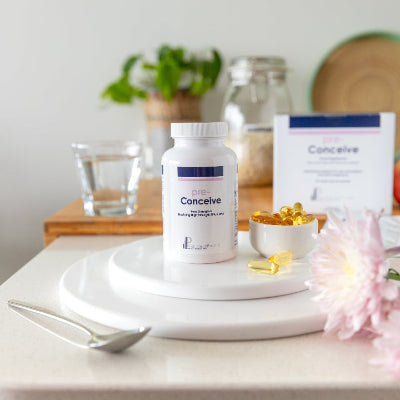When it comes to boosting fertility and improving your chances of conception, most people focus on hormones, ovulation tracking, and reproductive procedures. But there's a powerful (and often overlooked) player in the fertility puzzle: antioxidants. Antioxidants protect your reproductive cells, eggs and sperm, from damage, enhance hormone balance, and support embryo development. Whether you're trying to conceive naturally or undergoing assisted reproductive treatments like IVF, antioxidants are essential allies on your fertility journey. In this blog, we’ll explore what antioxidants are, how they work, and why they’re so important when trying to conceive.
What Are Antioxidants?
Antioxidants are compounds that neutralise free radicals. Free radicals are unstable molecules that cause cellular damage through a process called oxidative stress. While some free radicals are a natural byproduct of metabolism, factors like:
- Environmental toxins
- Poor diet
- Smoking
- Alcohol
- Stress
Chronic inflammation can increase their levels beyond what your body can handle. When oxidative stress overwhelms the body’s natural defences, it can damage DNA, disrupt hormones, and negatively impact fertility.
Why Oxidative Stress Is a Problem for Fertility
In Women:
- Damages eggs and reduces egg quality
- Interferes with ovulation and hormone balance
- Affects the health of the uterine lining and implantation
- Increases risk of miscarriage
In Men:
- Damages sperm DNA and reduces motility
- Affects sperm morphology (shape)
- Leads to higher rates of DNA fragmentation
- Lowers fertilisation potential
How Antioxidants Improve Fertility
Antioxidants help by:
- Protecting egg and sperm DNA
- Improving hormone signalling
- Reducing inflammation in reproductive tissues
- Enhancing the quality of cervical mucus and uterine lining
- Supporting embryo development and implantation
Top Fertility-Supportive Antioxidants
Here are some of the most researched and effective antioxidants for fertility in both women and men:
Coenzyme Q10 (CoQ10)
- Why it matters: Supports mitochondrial energy production, crucial for egg and sperm health.
- Benefits: Increases ovarian response, improves sperm motility and morphology.
- Dose: 200 mg/day
Vitamin C
- Why it matters: A water-soluble antioxidant that protects against DNA damage and supports collagen formation in the uterus.
- Benefits: Improves sperm quality, supports healthy ovulation, strengthens immune function.
- Dose: 1,000 mg/day
Vitamin E
- Why it matters: Fat-soluble antioxidant that stabilises cell membranes.
- Benefits: Improves endometrial lining and sperm motility; may improve IVF outcomes.
- Dose: 400 mg/day
Selenium
- Why it matters: Works synergistically with Vitamin E to reduce oxidative stress.
- Benefits: Supports thyroid health and sperm formation.
- Dose: 200 mcg/day
Zinc
- Why it matters: Essential for hormone production and antioxidant defence.
- Benefits: Boosts sperm count and ovulatory health.
- Dose: 15–30 mg/day
L-Carnitine
- Why it matters: Aids energy metabolism in sperm cells.
- Benefits: Improves sperm motility and overall quality.
- Dose: 1,000 mg/day
Cysteine
- Why it matters: Precursor to glutathione, the body’s master antioxidant.
- Benefits: Enhances egg quality, balances insulin (especially in PCOS), supports detoxification.
- Dose: 1,200 mg/day
Antioxidants & Fertility Conditions
Certain fertility challenges are especially impacted by oxidative stress and therefore may benefit most from antioxidant support:
- PCOS: Often linked to insulin resistance and inflammation. Antioxidants like NAC, Alpha Lipoic Acid, and CoQ10 can help.
- Endometriosis: Associated with high oxidative stress in pelvic tissues. Vitamins C, E, and omega-3s can reduce inflammation.
- Male factor infertility: Antioxidants significantly improve sperm quality and DNA integrity.
- Unexplained infertility: A comprehensive antioxidant approach may uncover and correct hidden oxidative stress.
Food Sources of Fertility-Boosting Antioxidants
Include these foods in your preconception diet:
- Berries (blueberries, strawberries, raspberries) – high in vitamin C and polyphenols
- Leafy greens (spinach, kale) – rich in folate and carotenoids
- Nuts and seeds (especially sunflower seeds, almonds, walnuts) – high in vitamin E and selenium
- Fatty fish (salmon, sardines) – excellent source of omega-3s
- Colourful vegetables (peppers, carrots, sweet potatoes) – packed with flavonoids and carotenoids
Final Thoughts:
A Fertility Foundation That Starts With Protection Oxidative stress is a silent disruptor of fertility but antioxidants can help level the playing field. Whether you’re just starting to try, have been on the journey for a while, or are preparing for IVF or IUI, integrating targeted antioxidants can:
- Protect your eggs and sperm
- Support balanced hormones
- Improve your chances of conception
- Boost embryo quality and pregnancy outcomes






